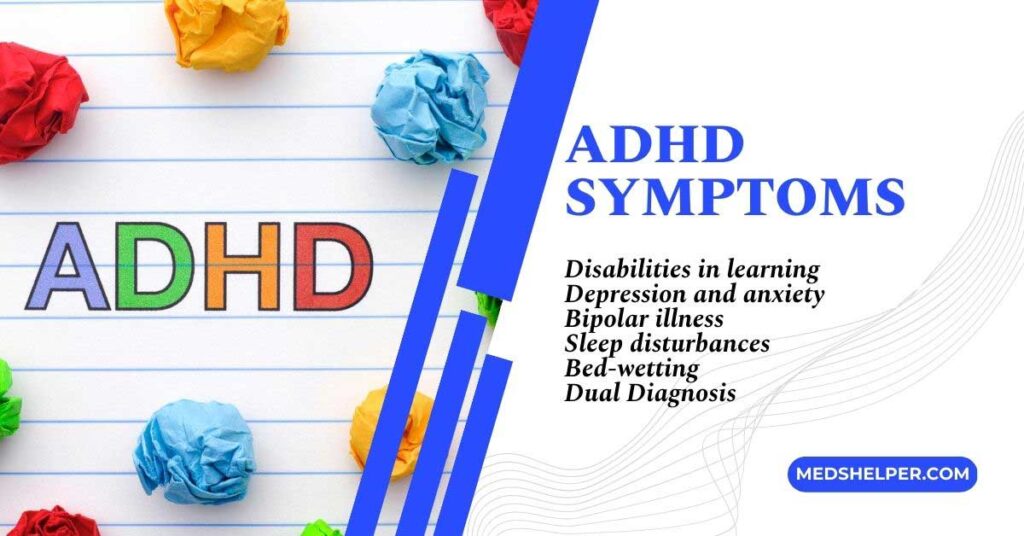IS ADHD GENETIC
Table of Contents
ADHD is among the most common neurodevelopmental disorders of childhood. It is most commonly diagnosed in children and lasts well into adulthood. A person with ADHD who has parents or siblings is at a higher risk of developing symptoms.
Is Adhd Genetic Or Developed?
The available data indicates that ADHD is genetic and is inherited from one’s parents. Despite starting a family background of ADHD, some individuals never develop the disorder. In reality, twin studies very never show 100% inheritance.
Is Attention Deficit Hyperactivity Disorder (Adhd) A Disability?
Despite the fact that ADHD is a neurological condition, it is not a learning handicap. Teachers can sketch out unique recommendations for a student without ADHD to help alleviate any effect on education for children.
What Is The Root Cause Of Adhd?
It’s unclear what causes ADHD-related brain changes. ADHD is mostly hereditary. Many children with ADHD have such a parent or relative who suffers from the disorder. Is adhd genetic or environmental? Children who were born prematurely were exposed to environmental pollutants, or whose moms used drugs are all at higher risk. ADHD also isn’t caused by excessive screen time, bad upbringing, or excessive sugar consumption.
Also read: Why is My Heart Beating so Fast?
Adhd Symptoms:

Around two-thirds of most children with ADHD have a co-occurring disorder. Many people are also affected by the signs and adhad symptoms of another illness.
The following are some of the most common conditions linked to ADHD.
- Disabilities in learning
- Depression and anxiety
- Bipolar illness
- Sleep disturbances
- Bed-wetting
- Dual Diagnosis/Substance Use Disorders
Treatment for ADHD is made more difficult by symptoms from other illnesses. Speaking with a trained specialist to assist develop a correct diagnosis can improve treatment effectiveness.
What Do The Three Types Of ADHD Define?
1. ADHD is a combination of Impulsive and Hyperactive Types
People who suffer from hyperactive ADHD need continuous movement. They frequently play, squirm and struggle to sit.
2. Types of Attention Deficit ADHD
People with inattention ADHD are prone to making mistakes because they cannot maintain their focus, follow precise instructions, and manage tasks and tasks.
3. The Combined Type ADHD
People with mixed-type ADHD have at least six symptoms of inattention and six or more signs of impulsivity and hyperactivity.
ADHD Adults
As adults, more than 60% of ADHD children still have symptoms. Treatment, however, is critical. Adults with untreated ADHD can have a detrimental effect on many parts of their lives.
Children with ADHD
According to the Centers for Disease Control and Management (CDC), roughly 8.8% of Americans aged 3 to 17 have been diagnosed with ADHD at some point in their lives. There are 11.7 percent men and 5.7 percent women in this group.
Girls with ADHD are likely to
- Daydreaming on a regular basis
- Rather than being hyperactive, be hyper-talkative
Because many signs of ADHD might be mistaken for ordinary juvenile behaviors, it’s difficult to tell what’s ADHD-related and what isn’t. Find out more on how to spot ADHD in toddlers.
Adhd Women
Females with ADHD are more likely to have trouble paying attention, whereas males with ADHD are more likely to suffer hyperactivity and impulsivity.
This could be one of the reasons why guys are diagnosed with ADHD at a higher rate than girls. Inattention is more difficult to detect than hyperactivity.
Hereditary Adhd Percentage
A recent meta-analysis of twin studies determined that the heritability of ADHD ranges between 77-88%. Therefore, the size is comparable to that of schizophrenia, bipolar disorder, and autistic spectrum disorder (approximately 80%, 75%, and respectively).
Diagnosis and ADHD Testing:
No one will be able to detect it in a test. After discussing symptoms with the child, parents, or teachers, and witnessing the child’s behaviors, doctors diagnose ADHD in kids and teens.
A youngster may complete a set of tests to examine their neurobehavioral health to validate a diagnosis of adhad test and learning difficulties. The following tests may be performed:
- The child’s and families medical and socioeconomic histories.
- A physical exam & neurological evaluation, which includes vision, hearing, language, and motor skill testing. If hyperactivity is linked to another physical problem, more tests may be required.
- A test of intelligence, talent, personality characteristics, or processing abilities. If the kid is of school age, these are frequently done with participation from parents and instructors.
- What causes adhd in the brain? The Neuropsychiatric Electroencephalography Assessment Aid (NEBA) System, which analyzes theta and beta waves in the brain. Children and teens with ADHD have a larger theta/beta ratio than children and adolescents without ADHD.
ADHD Treatment:
Different therapy is effective for children with ADHD. Consult your doctor to see if one or both of these treatments are appropriate for your kid.
1. Psychotherapy
There are various sorts of psychotherapy that really can help the youngster better control his or her ADHD symptoms. Psychotherapy, for example, can help your child open up regarding their feelings about coping with ADHD.
2. Theraputic Behaviour Modification
The purpose of behaviour therapy (BT) is to teach children how to keep track of their actions and then make appropriate changes. You and the child, as well as the instructor of your child, will collaborate.
3. Cognitive Behavioural Therapy (CBT)
Cognitive behavioural therapy (CBT) is goal-oriented, short-term psychotherapy that seeks to change negative thought patterns and replace them with a new frame of mind about the child’s feelings about themselves and the ADHD symptoms.
What Distinguishes Usual Behavior From ADHD?
Since certain ADHD symptoms were similar to those produced by other diseases, such as stress or mood disorders, diagnosing Attention Deficit Hyperactivity in adulthood can be difficult. Many people with Adhd also suffer from other mental health problems, such as sadness or anxiety.
What Can Parents Do to Assist?
If your kid has been given an ADHD diagnosis, you should:
- Find out everything you can on ADHD. Attend all of the counseling sessions that have been recommended to you.
- Administer medications with caution. If your child is receiving ADHD medication, make sure you give it to him or her at the prescribed time and dose.
- Collaborate with your child’s teacher. Inquire with teachers about whether your child needs an IEP or a 504 plan.
- Be a kind and purposeful parent. Learn which parenting techniques are ideal for a child with ADHD, as well as which ones can make the condition worse.
- Discuss ADHD with your child in an open and supportive manner. Concentrate on your child’s good qualities and strengths.
- Make friends with others to gain support and awareness. To stay up to speed on therapy and other information, join a support network like CHADD for ADHD.
When children receive treatment, eat a nutritious diet, get adequate rest and sleep, and also have good parents who understand how to deal with ADHD, their symptoms can improve.
Possible ADHD Factors Increase the Risk
Other than DNA, many other factors could influence who develops ADHD. This includes:
- Excessive exposure to the environment, for example, exposure to lead, can increase the risk of a child developing ADHD.
- A tiny percentage of children suffering a traumatic injury to the brain could be diagnosed with ADHD.
- This study, conducted by Trusted Source, discovered that women who smoke during pregnancy could increase the risk of developing ADHD.
- Babies born before the due date are more likely to be diagnosed with ADHD as they age, as per the study.
What to do if you’re in a Family History of ADHD?
ADHD is a genetic component. However, it doesn’t mean that your children will develop ADHD. The most important way to do this is to be alert to any potential signs your child might exhibit.
Early detection of symptoms can help your doctor recommend treatment earlier for your child to effectively manage the symptoms.
If a close parent has been diagnosed with ADHD or other disorders, you might wonder whether you’re affected. The ADDA Adult ADHD assessment is a great beginning point to test you for signs of ADHD.
You can then get a medical opinion to determine if you are a candidate for diagnosis. Inform them that you have family experience with ADHD.
Frequently Ask Questions
Can Adhd Be Treated?
ADHD isn’t preventable or treated. However, being aware of it earlier, along with a proper treatment plan and education program, can help a person, whether a child or an adult suffering from ADHD, to manage their symptoms.
Is Adhd Passed On By The Father?
The evidence available indicates the possibility that ADHD is a trait that is passed through the generations from parent to child. ADHD appears to be prevalent in at least some families. A minimum of one-third of fathers with ADHD as children have children suffering from the disorder.
Is Adhd Genetic From Mother Or Father?
Is adhd inherited from mother? A comparison of DNA sequences from healthy patients revealed an anomaly in the gene sequences. It is the case that children in children with ADHD kids showed greater and more frequent variation. Fathers who have ADHD can pass on this discordance to their children. Barkley states that the risk of inheriting ADHD ranges from 80 to 80%.
Is Adhd Dominant Or Recessive?
Those who have ADHD are much more likely to be have relatives or siblings who also suffer from the condition, according to study. It is not generally believed that a single genetic flaw is the origin of ADHD; instead, the inheritance pattern for the disorder is likely heterogeneous.
What Do Adhd Children Good At?
In general, kids with ADHD perform better when they receive plenty of attention from their coaches. They’re also more likely to excel in individual sports, such as diving and swimming, wrestling, martial arts, tennis, and even more uncommon pursuits, like fencing and horseback riding.
Is Attention Deficit Disorder Genetic That Can Be Traced Back To Grandparents?
Is adhd hereditary or genetic? ADHD is extremely hereditary, and the chance of becoming afflicted with ADHD is increased if grandparents or parents suffer from ADHD. The genes aren’t the sole decisive element; environmental factors also are a major factor.
Can You Get ADHD That Is Not Genetic?
ADHD tends to be a part of families. And generally speaking, it’s believed that the genes passed down from your parents are major factors in the development of the disorder. Research has shown that siblings and parents of someone who has ADHD have a higher likelihood of being diagnosed with ADHD themselves.
Is Add & Adhd Genetic?
It’s likely that either you or your partner have ADD/ADHD if your child has been diagnosed with that as well. Schedule a time to get evaluated. The sooner you find out, the quicker you can start treatment. And that leads to an improved life, marriage, and job.


